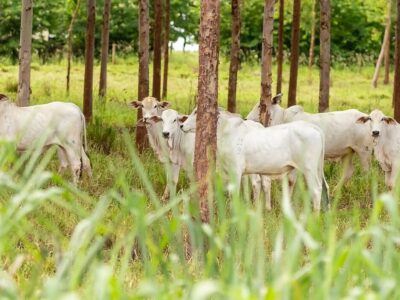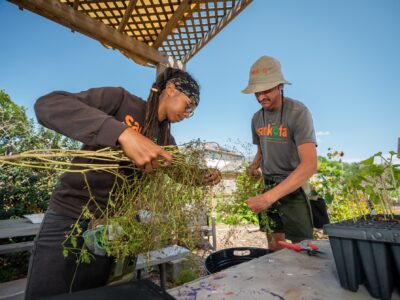Nick Speed, the founder and full-time operator of Ujima in St. Louis, MO, barely has time for a quick salutation and mild chuckle at Garden & Health’s joking suggestion that his name is a kind of “superhero” pseudonym.
“I appreciate that,” he says, laughing before quickly getting down to the very serious topic at hand: food injustice in America.
It’s a topic dear to Speed’s heart and one he has long been interested in before starting his community service endeavor, Ujima, in 2018. In addition to this particular interest, Speed seems to have been passionate about service to his fellow man for as long as he can remember.
Photo Courtesy Kailee Jo Edelen and Lincoln Nelson
“So I got introduced to this work through AmeriCorps. I did a term of service during 2016 and did an AmeriCorps term. And I really enjoyed that work,” Speed said. “And I was primarily the volunteer coordinator there. But a big part of my role was working with young people.”
“I was able to manage field trip experiences from pre-K through college and also was able to work with folks with developmental disabilities,” he continued. “And yeah, I just really enjoyed that work.”
This opportunity to get a taste of community service through AmeriCorps only sparked a greater desire in Speed to do more.
“I didn’t know what the future was going to be like for me, but I know I wanted to continue on that path,” Speed said. “And so got another job doing outdoor education at Gateway Green, which is now Seed St. Louis. So I did that from 2017 until 2020. And then through that, I also started Ujima, which is a nonprofit, in 2018.”
Ujima supports “mutual aid efforts across the Greater St. Louis Area” and provides “produce, herbs, and flowers to local farmers markets and businesses.” It also offers a paid internship to local youth and community clean-up programs throughout various neighborhoods in the city.
Photo Courtesy Kailee Jo Edelen and Lincoln Nelson
Originally, Ujima focused on a nonprofit cafe in the city, but the onset of the COVID-19 pandemic created an opportunity for a pivot.
“So, the pandemic caused us to kind of shift towards agriculture, just based on my background and being able to manage community gardens,” Speed said. “We started doing monthly produce donations through the community garden. And so we did that for a couple of years.”
“And then, in 2021, was when everything changed. We had some really incredible funders that allowed us to raise around $250,000,” he continued.
“And so from that, we were able to create our own urban farm, George Washington Carver Farms, just a few miles away from our community garden.”
Photo Courtesy Kailee Jo Edelen and Lincoln Nelson
Here, Speed’s voice becomes even more serious, and he gets into the heart of why he believes this is work worth doing, so much so that he is dedicating his life to it.
“For me, I think that agriculture represents the foundation for everything that we want to build,” Speed said. “So, we’re in areas that have experienced food apartheid, as well as environmental racism, and we really want to show up in that community, not just for providing more access to fresh food, but also to create education, jobs, and conservation efforts.
“And then, as we grow, we want to look at housing,” he continued. “How can we create housing opportunities for folks in an equitable fashion for future employees as well as folks in the community.”
Speed is clearly a man with a passion and a plan. When asked how others can get involved, his answer is simple and underscores a seemingly deeply internalized belief that given the resources and time, Speed and Ujima can accomplish anything.
Photo Courtesy Kailee Jo Edelen and Lincoln Nelson
“I would say the easiest way to get involved is to donate. You know, not just us with Ujima or George Washington Carver Farms … all of us that are doing this work are doing it with limited resources,” he said. “And so donating, even if it’s a small amount, goes a long way to supporting our efforts.”
He pauses as if wrapping up before adding one more important way to help.
“And I would say, continuing to advocate for the folks that are doing this work to politicians and local leaders. Because, unfortunately, a lot of our work is not taken seriously,” Speed said. “So, advocating our local leaders and having them see the importance of this work, I think, is also really important.”





